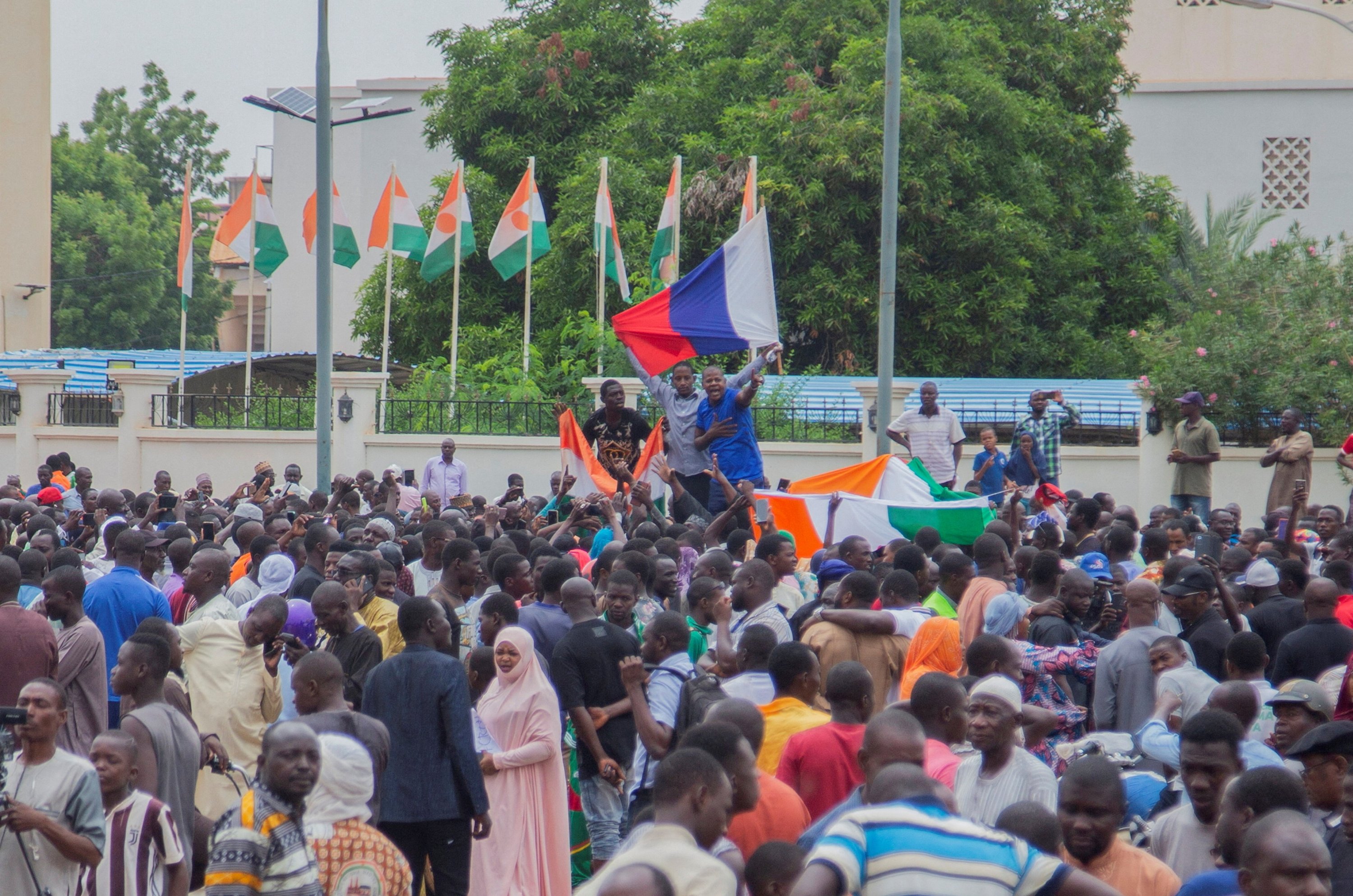Image is of coup supporters in Niamey, waving the flag of Niger and Russia.
While the coup in Niger is an obvious reason for this megathread's subject, the inspiration to focus here rather than somewhere else in the world this week came from @solaranus@hexbear.net's comment here.
Anyway, as a quick introduction to Niger - the country won independence from the French in 1960 and has since been in an alternating cycle of military governments and more democratic arrangements. In 2010, a junta took over the country from the military junta already ruling it, and then successfully transitioned the country to democracy within a year. President Issoufou was elected and then re-elected in 2016. President Bazoum was democratically elected in 2021, and has just been overthrown last week. General Tchiani looks to be the new head of state.
Like many countries that were previously colonies, outright colonialism by its imperial country has been replaced by neocolonialism by that same country. France issues their currency, thus allowing France to do what the US does with its dollar around the world but in miniature. The country is incredibly poor, surviving on subsidence agriculture, with much of its exports being minerals like gold and uranium, which many children under the age of 14 are employed in extracting. Also like other previously French colonies, the new guys in charge appear to be flipping them the bird, with Burkina Faso and Mali relatively recently asking them to fuck off. It is unlikely to be a coincidence that this is happening as internal dissent inside France itself continues to boil. Given the Russian flags being waved and Putin's promises to supply free grain to some African countries (and though Niger isn't mentioned, Burkina Faso and Mali notably are), one imagines that Russia also might have a hand in things.
Burkina Faso's president, Traore, has been talking with Mali and Guinea, and now Niger - all ruled by military governments - and asking if they're interested in federation, with Mali showing some interest. Traore follows in the tradition of Thomas Sankara, and has appointed a Prime Minister who is similarly aligned. Traore has recently met with a Chinese representative and has firmly aligned himself with Russia, saying that Burkina Faso has "one and the same outlook" on building a new world order, saying:
"Russia made great sacrifices to liberate Europe and the world from Nazism during World War II. We have the same history,"
"We are the forgotten peoples of the world. And we are here now to talk about the future of our countries, about how things will be tomorrow in the world that we are seeking to build, and in which there will be no interference in our internal affairs,"
"However, a slave who does not fight [for his freedom] is not worthy of any indulgence. The heads of African states should not behave like puppets in the hands of the imperialists. We must ensure that our countries are self-sufficient, including as regards food supplies, and can meet all of the needs of our peoples. Glory and respect to our peoples; victory to our peoples! Homeland or death!"
Here is the map of the Ukraine conflict, courtesy of Wikipedia.
This week's first update is here in the comments.
No update on Wednesday because I am still busy.
Friday's update is here in the comments.
Links and Stuff
The bulletins site is down.
Examples of Ukrainian Nazis and fascists
Examples of racism/euro-centrism during the Russia-Ukraine conflict
Add to the above list if you can.
Resources For Understanding The War
Defense Politics Asia's youtube channel and their map. Their youtube channel has substantially diminished in quality but the map is still useful.
Moon of Alabama, which tends to have interesting analysis. Avoid the comment section.
Understanding War and the Saker: reactionary sources that have occasional insights on the war.
Alexander Mercouris, who does daily videos on the conflict. While he is a reactionary and surrounds himself with likeminded people, his daily update videos are relatively brainworm-free and good if you don't want to follow Russian telegram channels to get news. He also co-hosts The Duran, which is more explicitly conservative, racist, sexist, transphobic, anti-communist, etc when guests are invited on, but is just about tolerable when it's just the two of them if you want a little more analysis.
On the ground: Patrick Lancaster, an independent and very good journalist reporting in the warzone on the separatists' side.
Unedited videos of Russian/Ukrainian press conferences and speeches.
Telegram Channels
Again, CW for anti-LGBT and racist, sexist, etc speech, as well as combat footage.
Pro-Russian
https://t.me/aleksandr_skif ~ DPR's former Defense Minister and Colonel in the DPR's forces. Russian language.
https://t.me/Slavyangrad ~ A few different pro-Russian people gather frequent content for this channel (~100 posts per day), some socialist, but all socially reactionary. If you can only tolerate using one Russian telegram channel, I would recommend this one.
https://t.me/s/levigodman ~ Does daily update posts.
https://t.me/patricklancasternewstoday ~ Patrick Lancaster's telegram channel.
https://t.me/gonzowarr ~ A big Russian commentator.
https://t.me/rybar ~ One of, if not the, biggest Russian telegram channels focussing on the war out there. Actually quite balanced, maybe even pessimistic about Russia. Produces interesting and useful maps.
https://t.me/epoddubny ~ Russian language.
https://t.me/boris_rozhin ~ Russian language.
https://t.me/mod_russia_en ~ Russian Ministry of Defense. Does daily, if rather bland updates on the number of Ukrainians killed, etc. The figures appear to be approximately accurate; if you want, reduce all numbers by 25% as a 'propaganda tax', if you don't believe them. Does not cover everything, for obvious reasons, and virtually never details Russian losses.
https://t.me/UkraineHumanRightsAbuses ~ Pro-Russian, documents abuses that Ukraine commits.
Pro-Ukraine
Almost every Western media outlet.
https://discord.gg/projectowl ~ Pro-Ukrainian OSINT Discord.
https://t.me/ice_inii ~ Alleged Ukrainian account with a rather cynical take on the entire thing.
Last week's discussion post.





 : "stop wasting my time and launch the counteroffensive already"
: "stop wasting my time and launch the counteroffensive already" : "commit suicide by minefield, jack"
: "commit suicide by minefield, jack"